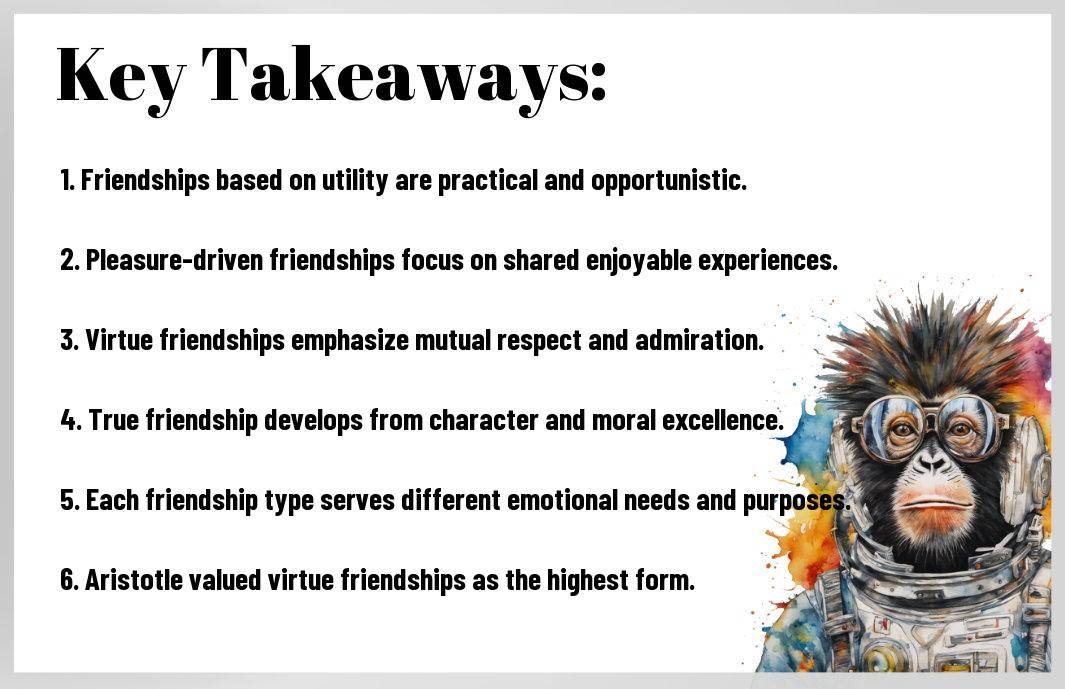
Newsletter Subscribe
Enter your email address below and subscribe to our newsletter

Enter your email address below and subscribe to our newsletter

There’s something truly fascinating about the concept of friendship, especially when we examine the thoughts of Aristotle. In this post, I’ll share with you his insightful categorization of friendships into three distinct types. Each type reveals different motivations and bonds that we experience in our relationships. Whether you’re looking to deepen your connections or simply understand your friendships better, this exploration will offer valuable perspectives that may resonate with your own experiences. So, let’s commence on this journey together and uncover the nuances of true friendship!

The foundation of friendship, according to Aristotle, rests upon three main types—utility, pleasure, and virtue. Each type serves a different purpose and brings unique dynamics to our relationships. While they may evolve over time and often overlap, understanding these categories can deepen our appreciation of the friendships in our lives. Today, I’ll explore the first two types, utility and pleasure, which can be especially relatable in everyday social exchanges.
By defining friendship through utility, we highlight relationships formed out of a shared benefit. These friendships often arise based on the needs we fulfill for one another, such as colleagues working toward common goals or acquaintances who exchange resources and support. I find that these types of friendships can be quite practical; they often help you achieve specific objectives or foster collaboration in various aspects of life. However, they tend to be more surface-level, as they may dissolve once the utility is no longer present.
Along with utility, friendships based on pleasure focus largely on the enjoyment we derive from each other’s company. These relationships often flourish in social contexts—think of the friends you laugh with, share interests, or have fun adventures. I see this type of friendship as one built on positivity and shared experiences. When you meet someone who brings joy into your life, whether through humor, hobbies, or engaging conversation, it creates a lively atmosphere that can be fulfilling and invigorating.
Pleasure in friendship may also come from mutual interests, like enjoying the same music, movies, or experiences. These bonds often thrive on shared enjoyment and can lead to memorable times together. However, it’s important to note that, while pleasure-based friendships can be delightful, they might not always stand the test of time, especially if the shared interests wane or circumstances change. Yet, while they last, they certainly add a splash of color and joy to our daily lives!
Some might say that the highest form of friendship is a rare gem, shining brightly among the more common types. This type of friendship, according to Aristotle, is built on a foundation of virtue, where both friends share values and strive toward a good life together. It’s not merely about enjoying each other’s company or having fun—it’s about recognizing the goodness in one another and working together toward personal excellence. When I think about my own friendships, the ones that stand out the most are those where I feel inspired and challenged by the other person’s integrity and character. It’s in these friendships that I truly feel supported in becoming the best version of myself.
Before we investigate deeper into this imperative aspect of friendship, let me clarify what I mean by ‘virtue.’ Virtuous friendships thrive on mutual respect and understanding, where each person brings out the best in the other. It’s not just about superficial traits like kindness or generosity, but about aligning one’s life purpose and moral compass. When I engage with friends who share similar values, I find that our conversations go beyond the ordinary; we explore life’s bigger questions and motivate one another to pursue our individual goals. This alignment creates a bond that fosters both trust and accountability, enriching my life in ways that basic companionship cannot.
Highest among the aspects of the highest form of friendship is mutual growth. This means that both friends are dedicated to supporting each other’s personal development. In my experience, this is where the magic really happens; you don’t just celebrate each other’s milestones but also challenge one another to push boundaries and embrace change. I feel that it’s important to have someone in my corner who not only acknowledges my achievements but also encourages me to strive for more. Such a friendship transforms into a partnership where both of us stand to gain and evolve.
Growth in this context isn’t just about achieving personal goals or ambitions; it’s about creating a shared journey that deepens our connection. You and I push each other to explore new ideas, step outside our comfort zones, and navigate challenges together. This ongoing process of encouragement and support cultivates a bond that feels enriching and transformative. It makes every triumph sweeter, knowing that we are both invested in each other’s progress and happiness. In nurturing this profound connection, we truly embody what it means to be friends in the highest sense, promoting not just our individual paths but a collective journey toward becoming more virtuous individuals.
Keep in mind that the growth and development of friendships are often influenced by the amount of time spent together. The more time you invest in a relationship, the stronger the connection tends to become. This is especially true for friendships that blossom from shared experiences, where laughter and challenges are faced together, creating lasting memories. I find that these moments can turn acquaintances into true friends and help deepen the understanding of one another’s values and perspectives.
Above all, building connections takes patience and effort. When you dedicate time to foster a friendship, you give it the space it needs to evolve. Whether it’s meeting for coffee regularly or engaging in activities you both enjoy, these shared moments lay down the foundation for a meaningful bond. It’s through this consistent interaction that trust and familiarity grow, making it easier to reach out during both good times and bad.
Role of time in creating lasting bonds cannot be understated. As friendships mature through shared experiences and trials, they often become more resilient and deeper. I’ve noticed that those friends who have been with me through various life stages often understand my emotional landscape in a way that newer friends might not. The depth of shared history adds another layer of connection that simply can’t be rushed; it develops organically over time.
Hence, I realize that lasting bonds are built on experiences that require both personal investment and a consistent presence in each other’s lives. The stories we share and the memories we create act as glues that hold our friendships together, making them more meaningful and enduring. I cherish those long-standing friendships, knowing they are the result of time well spent together, and am grateful for the connection I’ve been able to nurture over the years.
Now that we’ve explored Aristotle’s three types of friendship, it’s important to understand how to navigate through them in our daily lives. Friendship can be complex, and recognizing the depth of your relationships can help foster stronger connections and manage expectations. Sometimes, I find it helpful to categorize my friendships based on Aristotle’s framework. Here’s a little guide that might assist you in identifying the nature of your friendships:
| Type of Friendship | Description |
|---|---|
| Friendship of Utility | Based on mutual benefit and practicality. |
| Friendship of Pleasure | Centered around shared enjoyment and experiences. |
| Friendship of Virtue | Built on mutual respect, admiration, and growth. |
| Depth of Connection | Varies based on the type of friendship you share. |
| Emotional Investment | Greater in virtuous friendships than in others. |
After identifying the types of friendships you have in your life, it becomes easier to navigate them while setting realistic expectations. You might find that some friendships shift over time, changing from one type to another, or even merging multiple aspects of Aristotle’s classifications. Being aware of this can lead to more fulfilling relationships, allowing you to cherish those that enrich your life and recognize when it might be time to step back.
At times, it can be quite challenging to differentiate between the types of friendships. I often find that taking a moment to reflect on my interactions and feelings towards my friends can provide clarity. For instance, if I realize that I primarily connect with someone during fun outings, they may fall into the Friendship of Pleasure category. Conversely, if I find comfort and understanding in a friend’s advice during tough times, that relationship hints at a deeper connection rooted in virtue.
By categorizing your friendships, you can address your needs and your expectations more effectively. I suggest asking yourself a few questions: What do you gain from each friendship? How do you feel when you’re around them? This self-reflection can help guide you in nurturing the types of friendships that truly matter to you, bringing more joy and fulfillment to your life.
After recognizing the types of friendships in your life, it’s necessary to embrace change as it unfolds over time. I’ve experienced how friendships can evolve, sometimes taking unexpected turns. This natural ebb and flow can lead to deeper connections or prompt the need to let go of those that no longer serve you. Accepting this can be liberating, enabling you to focus on nurturing the friendships that resonate with you.
The journey of friendship is filled with phases and transformations that reflect our personal growth. As I connect with new people, I often realize that my previous friendships may require some recalibration. By embracing change, I foster an openness to new experiences and connections, allowing my social circle to grow broader while appreciating the foundational friendships that stand the test of time.

All of us experience the profound impact friendships can have on our overall well-being. From providing emotional support to fostering personal growth, the bonds we share with others play an necessary role in shaping our happiness and resilience. When I look back at my life, I can see how my friends have helped me navigate both the highs and lows, making my journey much more fulfilling.
Before I truly appreciated the value of emotional support in my friendships, I often underestimated how much I relied on my friends during tough times. It’s during those moments of stress or sadness that I found comfort in a friend’s listening ear or a heartwarming hug. Emotional support creates a safe space where I can express my feelings without judgment, ultimately leading to better mental health and an increased sense of belonging.
Among the many benefits friendships offer, personal development stands out as one of the most rewarding aspects. Having friends who challenge me and encourage me to step out of my comfort zone has had a significant impact on my personal growth journey. Whether through shared experiences or constructive feedback, friendships often help me discover new interests, skills, and perspectives that I might not have explored on my own.
Considering the diverse ways friendships contribute to our development, it’s clear that these connections can motivate us to pursue our passions and strive for our best selves. When I share my dreams and aspirations with friends who genuinely support me, I feel empowered to chase those goals. They not only inspire me but also hold me accountable, making the journey even more enriching. These friendships remind me that growing together can be just as fulfilling as individual accomplishments.

Many of us often think of friendship as a personal connection, yet it plays a vital role in building the larger networks of community. Just as the bonds we share with our friends bring joy and support to our lives, these relationships can create a ripple effect, enhancing the sense of belonging and cooperation among individuals. When friendships flourish, they lay the groundwork for healthier communities by promoting understanding, compassion, and collaboration. This is where Aristotle’s view of friendship transcends the individual, contributing to the collective welfare and harmony of society.
On the journey of friendship, building trust serves as the foundation for more significant relationships within our community. Trust creates a safe space where we can share our thoughts, dreams, and concerns without fear of judgment. As I nurture my friendships, I find that this trust extends beyond my circle, fostering connections with others and encouraging them to do the same. When we openly support one another and communicate honestly, we cultivate an atmosphere of reliability that reverberates throughout our communities.
Any strong community thrives on the quality of its friendships. When I engage with others and build solid connections, I contribute to a collective sense of security. Friendships often inspire collaborative efforts, whether it’s local initiatives or social gatherings, that unite people toward common goals. When I see my friends supporting one another, caring for shared interests, and participating in community activities, I know we’re creating a positive impact together. This sense of unity not only enhances individual satisfaction but also elevates the entire society.
Community thrives when friendships are nurtured, as they link individuals to a common purpose and shared values. Each friendly encounter you have can spark new ideas and actions that benefit others, encouraging them to connect and engage. Through these relationships, we all take part in a bigger picture, and that interconnectedness can transform not just our social landscape but also help forge a deeper sense of belonging and responsibility to one another. Every interaction counts, and each set of friendships has the potential to uplift and strengthen the fabric of society as a whole.
Ultimately, understanding Aristotle’s three types of friendship has allowed me to reflect on the various relationships in my life. Whether it’s the joy I find in friendships based on utility, the sentimental value of those based on pleasure, or the depth I aspire to achieve in friendships grounded in virtue, each type contributes uniquely to my social experience. I encourage you to think about your own friendships and how they fit into Aristotle’s framework. It can be enlightening to see the different ways we connect with others.
If you’re interested in diving deeper into this topic, I highly recommend checking out Aristotle’s Three Types of Friendship | by Gustavo Guida. The insights provided can enrich your understanding of friendships and help you appreciate the nuances of your relationships even more. Here’s to nurturing the meaningful connections in our lives!
A: Aristotle identifies three types of friendship: friendships of utility, friendships of pleasure, and friendships of virtue. Friendships of utility are based on mutual benefit, where individuals come together for practical reasons. Friendships of pleasure focus on the enjoyment and shared experiences between friends, like engaging in hobbies or activities. Friendships of virtue, the highest form of friendship, are based on the mutual respect and admiration for each other’s character and values.
A: Friendships of utility are primarily formed out of practical reasons; they benefit both parties in some tangible way, such as collaborating at work or supporting each other in business endeavors. In contrast, friendships of pleasure are formed because individuals enjoy each other’s company, sharing laughs, interests, and activities. These friendships are more about emotional enjoyment rather than practical advantages.
A: Friendships of virtue are esteemed because they are grounded in a deep bond of mutual respect and admiration. In this type of friendship, individuals appreciate each other’s moral qualities and strive to help each other become better versions of themselves. This form of friendship is enduring, as it is based on personal growth and ethical alignment, rather than external benefits or transient pleasures.
A: Yes, it is possible for friendships of utility and pleasure to evolve into friendships of virtue. This can happen as individuals get to know each other more deeply, discovering shared values, beliefs, and a mutual admiration. As the relationship matures and emotional depth increases, a friendship can transition from one type to another, growing in significance and impact on both individuals’ lives.
A: Cultivating a friendship of virtue involves fostering open communication, trust, and mutual respect. Engaging in meaningful conversations, sharing life experiences, and supporting each other’s personal growth can help deepen the connection. Additionally, spending quality time together and being honest about thoughts and feelings can strengthen the bond and lead to a more profound friendship grounded in virtue.
A: Yes, all types of friendships play a significant role in an individual’s life. Friendships of utility and pleasure can provide support, joy, and companionship. They fulfill different emotional and social needs, adding variety to relationships. However, while these friendships are valuable, friendships of virtue can offer a deeper sense of fulfillment and meaning, fostering long-lasting connections that contribute to one’s personal and moral development.
A: Friendships of utility and pleasure may face challenges like changing circumstances or shifting interests. For example, if a partnership is built solely on a business or a particular activity, the friendship may dissolve if those circumstances change or the individuals move in different directions. Additionally, friendships of pleasure may wane if individuals no longer share the same interests. Sustaining these friendships requires effort and willingness to adapt to each other’s lives and needs.